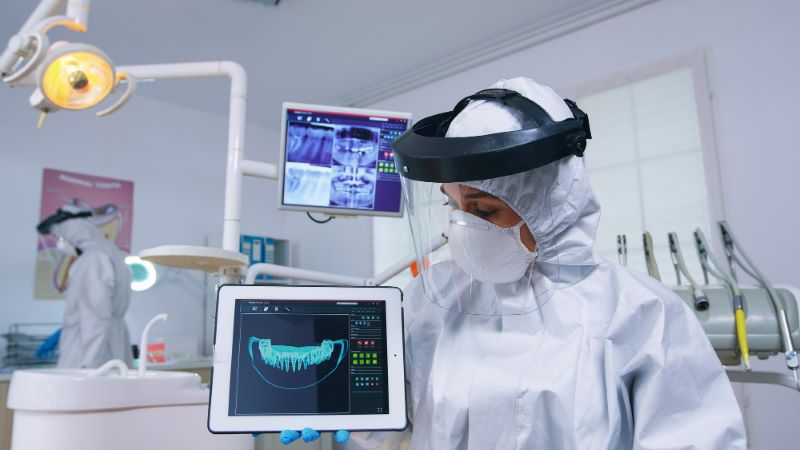Benefits of Dental Software
In this article, we’ll explore the benefits of dental software and how it can improve the efficiency of your practice. Dental software can provide a variety of benefits to dental practices, including:
Improved Patient Care
Dental software can help you keep track of patient information, treatment plans, and appointment schedules, allowing you to provide better care to your patients.
Increased Efficiency
By automating administrative tasks, such as appointment scheduling and billing, dental software can free up time for staff to focus on other important tasks.
Improved Communication
Dental software can help facilitate communication between staff members, making it easier to coordinate patient care and share important information.
Better Record Keeping
With dental software, all patient information can be stored in one centralized location, making it easy to access and update when needed.
Types of Dental Software
There are many different types of dental software available, each with its own unique features and benefits. Some of the most common types of dental software include:
Practice Management Software
This type of software is designed to help dental practices manage administrative tasks, such as appointment scheduling, billing, and patient records.
Patient Communication Software
This type of software is designed to help practices communicate with patients through text messages, email, or other digital channels.
Treatment Planning Software
This type of software is designed to assist in treatment planning by providing tools for diagnosis, case presentation, and treatment simulation.
Imaging Software
This type of software is used to capture and store images of teeth and other oral structures, which can be used for diagnosis and treatment planning.
Choosing the Right Dental Software
When choosing dental software for your practice, there are several factors to consider. These include:
Features
Make sure the software has the features you need to manage your practice effectively. For example, if you need to manage appointments and billing, look for software that includes those features.
Ease of Use
The software should be easy to use and navigate, with a user-friendly interface that doesn’t require extensive training.
Integration
Look for software that integrates with other systems and tools you use in your practice, such as electronic health records or patient communication platforms.
Cost
Consider the cost of the software, including any ongoing fees or maintenance costs.
Dental Software Comparison Table
To help you compare different dental software options, we’ve created a comparison table. Note that pricing and features may vary depending on the specific software provider.
| Software Name | Features | Ease of Use | Integration | Cost |
|---|---|---|---|---|
| Dentrix | Practice management, patient communication, imaging | Easy to use, intuitive interface | Integrates with a variety of systems | $500-$800/month |
| Eaglesoft | Practice management, patient communication, imaging | Easy to use, customizable interface | Integrates with a variety of systems | $200-$400/month |
| Open Dental | Practice management, patient communication, imaging | User-friendly interface, customizable workflow | Integrates with a variety of systems | $169-$269/month |
| Curve Dental | Practice management, patient communication, imaging | Intuitive interface, cloud-based | Integrates with a variety of systems | $495/month |
| Carestream | Imaging | Easy to use, customizable workflow | Integrates with a variety of systems | Contact for pricing |
Important Notes on Dental Software Usage
While dental software can be incredibly beneficial for dental practices, it’s important to note that dental software is a tool and should be used appropriately to maximize its benefits. Here are some important notes to keep in mind when using dental software:
Training
Make sure all staff members are properly trained on how to use the software. This will ensure that everyone is using it effectively and efficiently.
Data Privacy and Security
Dental software contains sensitive patient information, so it’s important to ensure that the software provider has proper data privacy and security measures in place.
Regular Backups
Back up your data regularly to ensure that you don’t lose any important patient information in case of a system failure.
Regular Updates
Keep your dental software up-to-date with the latest versions and updates to ensure optimal performance and security.
Customization
Customize the software to fit your practice’s specific needs and workflow. This will make it more efficient and easier to use.
By following these important notes, you can maximize the benefits of dental software and improve the efficiency of your dental practice.
Conslusion
Dental software can be a valuable tool for dental practices looking to improve efficiency, patient care, and communication. With a variety of software options available, it’s important to carefully consider your practice’s needs and choose the software that best fits your workflow and budget.
Remember to prioritize proper training, data privacy and security, regular backups and updates, and customization to make the most of your dental software. By doing so, you can streamline administrative tasks, improve patient care, and ultimately, grow your practice. (DW)
Follow BloggerBorneo.com @Google News























